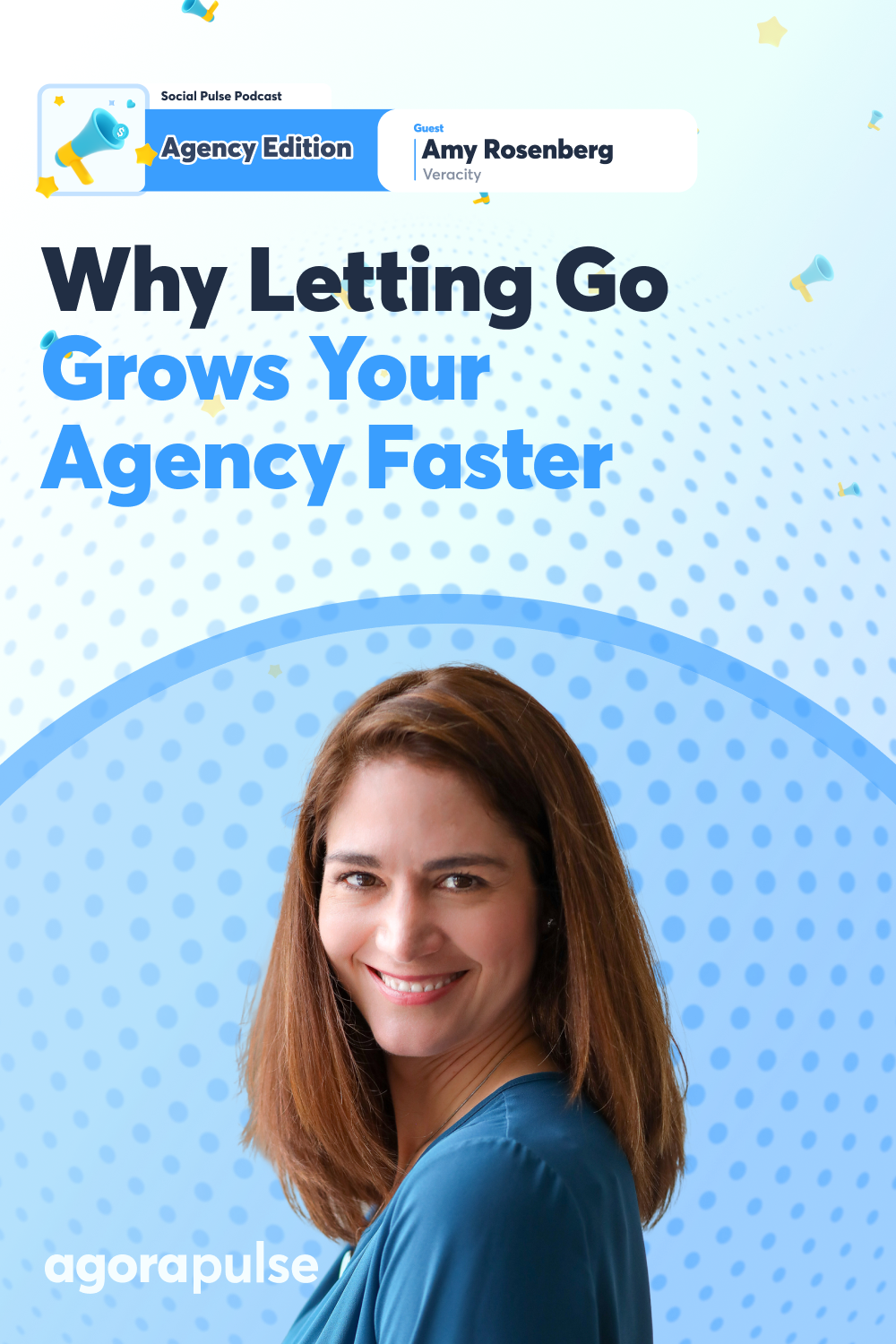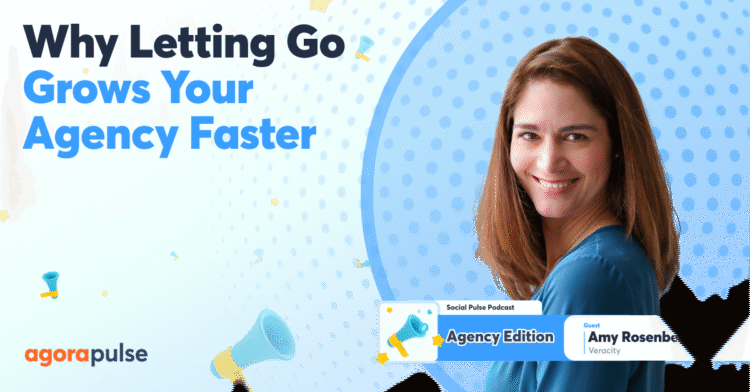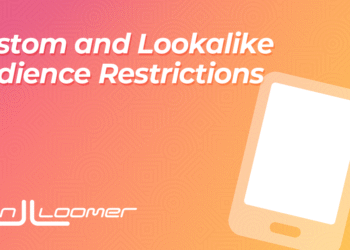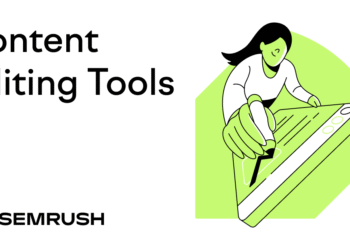Every agency owner knows the feeling of that pit in your stomach when you hand off an important client project to a team member. What if they miss something crucial? What if the client isn’t happy? What if this reflects poorly on the reputation you’ve worked years to build?
So you hover, you revise, you redo work that was perfectly fine, and you convince yourself that “it’s just easier if I do it myself.” But here’s the brutal truth: this need for control isn’t protecting your agency; it’s strangling it. When you’re the bottleneck for every decision, every deliverable, and every client interaction, you’re not running an agency; you’re running an expensive freelance operation with overhead.
That’s where our guest today comes in to help. Amy Rosenberg is the president of Veracity, a marketing and PR agency she founded in 2008, and she’s been recognized as a “Top Woman in PR” by PR News. Amy learned PR from the ground up, working her way from intern to management before starting her own firm, so she understands both sides of this equation intimately. She’s the author of two award-winning books, including “A Practical Guide to Public Relations for Businesses, Nonprofits and PR Leaders,” and, more importantly for our conversation today, she’s mastered the art of building a team she can trust with her reputation and her clients’ success.
Recap
Social Pulse Podcast host Mike Allton and guest Amy Rosenberg talked about:
- Control is the enemy of scale: Agency owners must recognize that their need to personally touch every project creates an artificial ceiling on growth and team development.
- Trust is built through systems, not hope: Successful delegation requires establishing clear processes, quality checkpoints, and communication frameworks before letting go of direct oversight.
- The right team changes everything: Hiring people who genuinely care about quality and client success makes the transition from control to trust not just possible, but profitable.
Resources & Brands mentioned in this episode
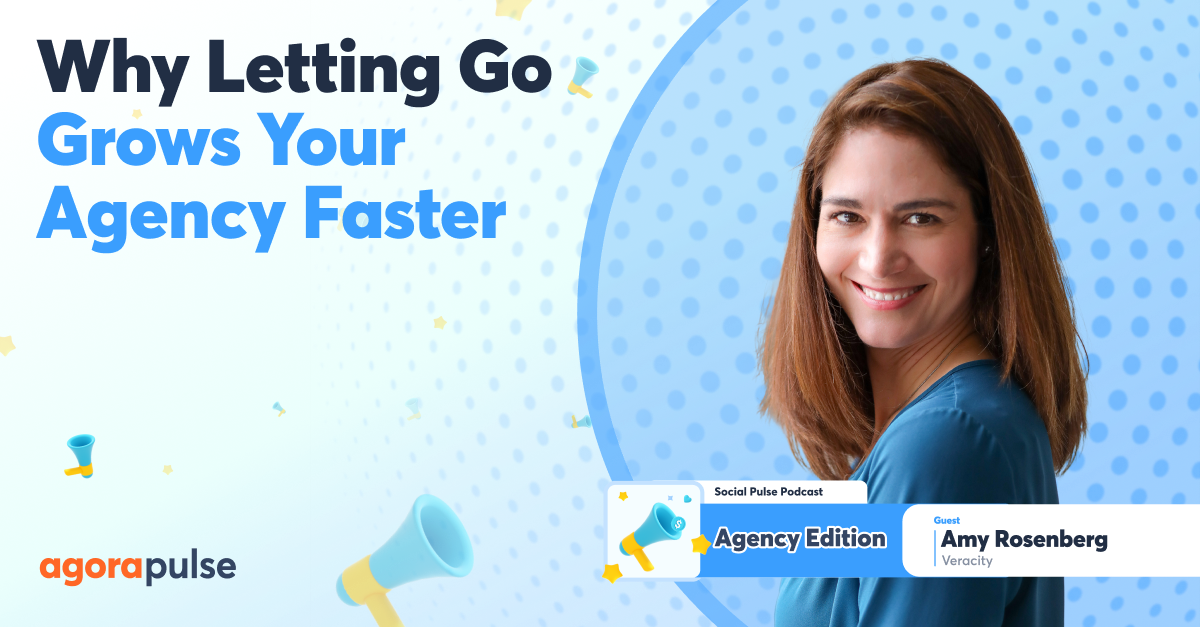
Full Transcript
(lightly edited)
Mike Allton: So glad to have you on board here, Amy. I’d love it if you could start by just taking us back to the early days of Veracity.
When did you first realize that you needed to let go of everything and not control everything that held back your agency’s growth?
Amy Rosenberg: Probably from the beginning, but I guess I’ll even take a step back further, which was when I started Veracity. I was a freelancer or a contractor working on my own. And that’s a little different than having an agency. So I was always so used to doing things on my own, whether that’s at a different PR firm or on my own.
And then I just kept getting clients. It wasn’t really something I thought about growing the firm. I just kept getting clients, and I realized that I can’t do everything myself. All that to say, this is, it’s not like an easy thing to just say, oh, just delegate. It took a long time for me to learn how to do that.
And just at the end of the day, I realized that by delegating, I’m serving my clients better. So once I had that mind switch, instead of thinking of it as being self. Serving, oh, I need to grow. Like I sometimes, and maybe even, especially as women, we’re not trained or taught to be self-serving, thinking about growth.
And not that’s self-serving. I’ve actually switched my mindset around that as well. But, just reframing it and seeing from practice that the clients are taken care of in a better way when other people are working on the clients, and that kind of evolution. I saw that happening. And it changed, and it changed in so many ways.
First of all, it was just about time. I just realized that, oh, if. So and so writes them back faster and better, and they actually have more time and bandwidth. They can serve the client better. But then now, as I’ve been growing my agency and growing myself personally. I’m realizing I don’t know a lot of things anymore, which is funny to say when you’ve written a book, but I’ve switched kind of the way I think, which is, it’s really basic, yeah, of course.
I feel like someone coming out of college is gonna know how to do, possibly know how to do social better than I, or, a different mindset. I might need to tap into, different generational mindset or just see that. Oh, I don’t always know what I’m talking about, right? Like I, I think a certain thing should be done a certain way, and then I see it done a different way, and I think, why not?
And really, what I’m talking about is PR pitches. So an example is. We had someone, a contractor we’ve used, come on to our firm and help pitch our podcast interviews for our clients. And I’m seeing they’re using a lot of emojis, and I don’t know how I feel about that. What does that look like? What do I know? Why don’t we just try it? Maybe this person, like they’ve been pitching podcasts successfully, who am I to say that the old way was the better way to do things? So that’s a whole long answer to your question.
Mike Allton: No, but it’s great, cause to me it really illustrates that you had a very logical perspective. I felt a very emotion-free perspective. And whereas I think a lot of the agency owners that I see are having trouble letting go. It’s very emotional for them. They’re letting their ego get in the way; they’re not ready to say to themselves or publicly. I don’t know how to do that in my policy.
Amy Rosenberg: Yeah. There are two different things. There’s the whole. That’s a different level. Just saying that you don’t know, that’s just almost I don’t even wanna approach that yet. ’cause it’s not to say I’m advanced or anything, but I feel like that’s a different level of thinking. And I think maybe that came for me after I practiced delegating. I could see that. When I practiced delegating, things went better. And so
I think the first step is to practice giving things away. And I took a long time to do that. And I can tell you about my journey of delegating if you want.
Delegating: the Four-Hour Work Week Playbook
Okay, let me just be honest. I started reading Tim Ferriss’s Four-Hour Work Week, and that was a game-changer. Now that book is not about working four hours. The whole thing is about how to do more with less. And he has a whole chapter on delegating, and he really just says that delegating is a practice. That we have to get better at. And so even with that book, if he is addressing it, like if you’re on your own, an agency owner, whatever you can do, delegate.
But even if you’re employed, you might wanna start. Practicing delegating through hiring a virtual assistant who can do your personal tasks for you, because this is a practice and it’s a skill to delegate. And so I read that book, and I was blown away by other things too, like creating products and this and that. But, in reading that book, I thought, okay, I guess I’d better do this. And I, this is just on my journey to becoming a firm. I hired a freelancer from Upwork, where you can find a lot of help.
I’m not a trusting person. Okay. And I used to be a control freak, especially with PR, ’cause we do have systems in the right way to do things right? And I can talk about what those systems are. They’re pretty simple. But I hired this person, and I could just tell right out of the gate that she would’ve been a good PR person because of the way she followed up with me before I hired her.
Number one, I thought. It’s hard to let go. So it’s oh gosh, I’d better hire this person after a while. She followed up diligently on a schedule, again, a system for pr, and I liked that, and I liked the way she was just put together in her words, whether that’s speaking or written.
And I just thought, yeah, I could, I, yeah, I’ll give her some work, and I could just see, and it’s a slow process, right? I gave her a few projects here and there. It looked good, it worked out. But of course I had, I put my own stamp on everything, and in a way I was training her a little bit. Let’s be real.
I had more experience, and that’s okay. And so she and I ended up working together for years, at least five years. And this is just freelance. I always wanted to hire her, but she always wanted to stay on her own. That’s fine. And basically, I don’t know if this is true or not, but I feel like for one whole year, I practiced giving her everything.
So let’s pretend I have five clients. That’s it’s only manageable in a PR firm that has retainer clients. You can only really handle four to five at a time. Okay? So I was like maxed out. So I practice giving her everything, and when I say everything, I read it as well. Okay? And there’s a system around that.
We always have to have editors, especially in PR, because it’s very written-heavy. But I still gave it to her. And the trick in that is thinking you, there are little traps you can fall into thinking, oh, it’ll be faster if I do this, oh, I’m doing the nice thing by sending this myself, but then it’s never faster because you always hear back from the client, and then you feel like crap. I initiated this email.
I need to respond right away. I don’t have time. So if she had just sent it out, even if I had written the email for her to send out, let’s be real sometimes. I’ve done that then. She has to deal with the responses, and I don’t, which is good. There’s that, but then often so there’s that, thinking, oh, I don’t have the time.
Or it’ll be faster. There’s that. But then the other thing to think about is what I do as a self or I’m a service person, like I’m self-service oriented in my firm. Servant leader. Yeah. So I think I’m gonna do this for her because that’s nice. I’m gonna email the client for her. Actually, now I’ve realized that’s not nice because she wants to be the client-facing, she wants to be the one to have the idea or whatever.
And also, what’s nice is helping people along in their professional careers. And so this is how I can do it. So that’s a few things about. Delegating, and so it really did take a year, and then after, and she was just the perfect person to do that with because she left, I guess I was micromanaging, she let me, right?
But in a PR firm, we’ve always had systems, like even when I worked at bigger firms elsewhere, where everything has to be edited by an editor, and that’s not rude, that’s saying, like the best writer in the world has to be edited. That’s just silly. It’s so even at the ad firm where I worked, we used to pass around hard copies of things, and we would have to sign our initials to say that it was that we edited it.
Okay. But if you’re thinking about that, especially with ads you are going to print, and your client is spending money on them, you really need to have some due diligence with that. So we’re just used to that in our practice. As PR people. And then just reading things. It helps, like I know, okay, this is a good pitch.
It’ll probably get landed, and then we’ll narrow down from there, and we’ll track based on our media list. So we’ve turned our media list. Into interactive project management tools, but they’re just in Google Docs, and it says exactly what’s happened with each contact, so I don’t have to ask a question.
I can just go in there and see, oh, this isn’t running. Why is that? Oh, she only reached out once. Our system is to reach out twice. Like it’s really simple. And so if you create these systems around things, then that helps, but then also it helps me. Ask questions, where if someone’s coming to me and saying, Hey, this isn’t running.
All I have to say is, did you reach out twice? And asking it that way, if I already knew that was a system, it makes it feel like I’m not micromanaging or nitpicking too much, and for the other person. And then we can have a conversation about what you did. What didn’t you do?
Because hey, maybe I can help you.
What was the biggest fear that you had to overcome while you were going through this delegating journey?
Amy Rosenberg: It’s a good way to frame it because the smaller fear always goes into the deeper fear.
So the initial smallest fear is that they’ll do it wrong, but the problem with them doing it wrong is that I’ll lose my client. And then that goes into the deeper fear of not being able to pay the mortgage or whatever. So it’s a big deal. So, as an agency owner, it’s a problem if things aren’t done right.
And so we are validated in looking over people’s shoulders. It’s okay. But then you just have to reframe and just see how it’s going. And it means take your time with people, like I’m just lucky I have a really good number two here, but other people, I just don’t know.
And so I will take my time. And I will train somebody up very slowly, and that’s an evolution of my firm. It’s a slow pro. I’m a turtle. I like marathon running. I don’t do it anymore, but I’m not a fast person. And our firm’s been around for 15 years, and I don’t know if it’s grown a lot, but that’s okay. I still have my clients, but also there’s that fear-based where it’s like slowly letting go and then seeing, “Oh, okay. I haven’t lost my clients.” You know what I mean?
Mike Allton: Yeah. And so as you’re going through here, you’ve got systems in place that help you trust, I think that the work is being done well, systems that also have built-in verification.
’cause you’re right, everything needs to be edited. Author Stephen King has his books edited. No one’s publishing anything that hasn’t been looked at by an editor at least once. Maybe multiple revisions if they’re lucky. How do you navigate that?
Did you have to create some of these systems, or did you already have all the systems and processes in place, and everything worked?
Amy Rosenberg: Good question. Number one: the editing. That’s always been a thing, and I’ve always tried to reframe editing for people and say my first editor ripped my stuff apart, and I really appreciated her for that. And she edited my last book, like she’s retiring now, but, so she taught me how to write, so I always reframe it with that. And then ideally, though, we wouldn’t have to rip stuff apart because then you’re getting it right after a while. But so editing, that’s pretty basic. And yeah, everybody does that. So, where I did create my own systems has to do with the PR follow-up. And so I didn’t know of any systems when I worked at a PR firm.
And so I created this. It’s almost like if this, then that kind of system, where if, because PR is really hard, and so if you don’t get a placement, you might be wondering why, you know, and ’cause you can’t control a lot of that. And I feel like we just follow up twice. Then that, and it’s not like we’re gonna drop it.
But typically, the most basic thing is that I created a follow-up twice, and then after the second time, I then rethink things, and then come talk to me. Then either drop it or come up with a new angle, or a new contact, or whatever. And that’s that. That’s all I have. And also tracking the media list is really a good idea.
And we have stuff around that because I have a tool to use and everything. But so that’s really basic. That’s like media relations, which is hard. But then what if we wanna take a wider approach rather than in the nitty-gritty? So then my second book, The Practical Guide to PR, is trying to create systems around marketing that just incorporate PR and the system that.
It is planned. That’s it. And so if we can plan, then maybe we’ll do it because this is the problem is there’s too much to do in marketing. So if you can create whatever your system is, then. Ideally, we would do it, but sometimes it’s hard. So I don’t know if you want me to get into that at all.
Mike Allton: Yeah, first of all, I relate to everything you’re just saying, ’cause yes, as a pure digital marketer, a lot of stuff is, Hey, you know what? We’d like to do this tomorrow. Can we get this shipped tomorrow? So there’s zero, very little. Oftentimes, we will plan a quarter, but then things get derailed halfway through the quarter for whatever reason, and we have to go in a different direction.
As you were letting go, were there any disasters, near-misses, anything that had you questioning whether or not that was a good idea? And how did you handle that without just going back to doing everything yourself?
Amy Rosenberg: Good question. To be honest, I probably did go back to doing everything myself, but I do have a, I do have a story, and again, I’m a turtle, like this is a long process, but the story I have is. In the beginning, when I had this company, I hired a different freelancer and I asked her to do some PR. That’s why let’s just do some PR well on this client, right? And this was a new gym that was opening up, and the client was really nervous and wanted to get a lot of PR. I asked for the materials to see because it, so the basis of the PR is the pitch. It’s not the press release or whatever.
And so it’s very common to have the press release reviewed but not the pitch, right? So there was no coverage coming, and I was just thinking. I should probably see the pitch because that’s why, that might be why I could probably fix it or whatever, and see what happened.
And I had given her actually all of these different kinds of pitch angles, and I wanted pitches on different angles. So like, for senior citizens. To tennis players, that kind of thing. And come to find out, there were no pitches. Like she didn’t do ’em. So basically, it was like we were having this conversation, Why aren’t we getting the coverage?
Why aren’t we getting the coverage, and can you send me the pitches? And she just ended up quitting on me. And I was like I still need the pitches because that’s the work I paid you for. I need those ’cause then I’ll use them or fix them. And there were no pitches, just didn’t do ’em. And so for me it’s oh wow.
That was a problem. So being a small firm, I probably just did all the work after that, right? Like I had a mad client, like I’m not leaving that alone. And like my town is really small. I was, that was another thing I was worried about, people talking about me if I wasn’t perfect.
But I picked up the slack. Got it done. And, but I guess what I started to do, just really simple, is to see people’s pitches. That’s really simple, and I’ve realized that I don’t, pitches are actually more important than press releases anyway, so the old way of reviewing press releases might not even be as important, but I’ll always look at somebody’s pitch unless I trust them after a while, right? So if I know, okay, they’ve been doing this for a long time, I don’t need to look at their pitch, it’s fine. But sometimes I will look at a pitch and I’ll think, oh, I wanna change that.
But at least it’s not, you can calm down a little bit. You need to show respect, like if it’s on message or on target, right? I need to show respect for other people. Because
I feel like if we change things too much, whether that’s just verbally, like nitpicking how somebody speaks, or on paper, I will create a firm where people are just questioning what to do too much.
So I’ve just learned how to back off, not just in the editing, but in the nitpicking how people talk to clients a little bit, even though they’re always polite, but meaning there are a few things that they say where I might say, oh, I don’t know that I would’ve done that. Where it’s like taking away, so not a service, but take, let’s say, oh, we’re not gonna do this blog post because we ghostwrote an article for you that we got placed on a third party, so we’re gonna, we’re not doing that. For me, I’m an over-server. So, my first instinct is no, let’s do it.
But I’m thinking, wait, you want to empower this person? This person’s probably better at business than you because they’re. They don’t want to overserve. Why don’t you just take a beat? You know what I mean?
Mike Allton: I love that. Basically, you’re talking about coaching your staff, which we do all the time. We have a tool called Gong that records every single sales call. So that a sales manager can review every single sales call and look for coaching moments to insert there. That’s basically what you’re talking about there.
And I loved how even though you went through a fairly awful, and I would’ve been mortified experience with a client, you still used that to figure out, okay, how can I prevent this from happening in the future?
Oh, I need a process to make sure that I’m reviewing. Pitches. And by the way, I’m also learning a little bit about PR in this interview, so thank you for that. But folks, we’re talking with Amy Rosenberg about what it was like to get out of the trenches of her agency so that she could start directing it better.
And in a moment, we’re gonna talk about a potentially negative mindset. But first, let’s hear how another agency has grown.
Mike Allton: So I’m wondering what role hiring plays in this equation.
Are there specific traits, experiences, or mindsets that you look for that indicate that somebody can handle client-facing responsibility?
Amy Rosenberg: Good question. So I think it’s just about systems, which I used; I’m always rethinking how I do things, and assuming it might be wrong just to be growth-oriented.
But I’ve had systems where it’s okay, if they don’t send the follow-up, thank you. Note, then. I’m not gonna hire them. And that just means email at this point. It used to be a, yeah, a letter. So there’s that. But then also if they have a typo in their email, that’s an out for sure.
But so it really has to do with their follow-up. And, but I, all that to say is we need to, I really wanna be mindful of different cultures, so I wanna rethink that because some cultures. They might not know that’s what we want, either in the US or just the way I was raised might be different from the way somebody else was raised.
And that’s not really fair, especially when we’re talking about DEI. So we need to rethink that. But all that to say, I did hire somebody probably too fast for it, this is freelance. So I do have somebody on staff full-time. But for freelancing, I do feel like you can test the waters a little bit often.
Some freelancers can be full-time after a while, but I hired them too fast. It didn’t work. They didn’t do the work again. And how I catch that is just we’re paying attention, especially in the beginning. And so the next time it was time to hire somebody, I gave my SAE, actually, she’s an account manager now, I gave her two freelancers that I told her to pick, and it was like she picked the one that she probably should have because they do all the things you’re supposed to do, which is the follow-up and this and that. But often I don’t, I do get excited about other people. Like, I get excited when somebody brings a lot of energy to the room, and I wanna move with that. Rather than sit and late and see if they’re doing the appropriate follow-up.
Mike Allton: That makes a lot of sense. I can appreciate where you’re coming from a cultural awareness perspective, but at the same time. The hires have to exhibit the kind of traits that you know they’re gonna need in their role. Typically, when I’ve hired folks in the past, I need people who I know are in a constant learning mode because digital marketing is changing rapidly all the time. And so I ask ’em questions like What are you reading lately?
And if they say something like, Oh, I don’t read books, full stop. Yeah, that’s a huge red flag to me. Then how are you learning? How are you growing? Sure. Maybe they come back and say I prefer to listen to audiobooks or videos. Okay. That’s fine. As long as you’re learning and consuming information in a new way.
Amy Rosenberg: I’ll tell you. One tool that we use is Muck Rack, which is a media database. I can talk about that ’cause it’s so cool. But what I’ll wanna do, especially with a freelancer, is just to note if they have experience in PR, media databases, because especially if they’re a freelancer, if they are paying for a media database, that tells me they’re serious about their work.
And they’re not just doing this part-time or whatever, because some of those seats can be expensive. But, then, I’ll also look for experience in a little bit of AI and social, ’cause that does help. And of course writing. All we do is write, but that’s becoming less important, actually, with AI.
Not that I can always write with AI, but I can use AI to edit. But anyway, so we look at those things, and then, honestly, it’s not really about media relationships. It’s really about all that shows me how much you care about the work and how dedicated you’ll be. But to answer your question about our tool that we use, which is Muck Rack.
So why we like Muck Rack because it’s one of the rare media databases that can connect with Google Analytics. So with that, I can point back to my results. Actually, meet could mean something even though oftentimes, let’s say you get a hit in the New York Times, people think that’s a big deal, but if I’m selling, so we help clients that are either selling really high.
Big purchases like a house or really hard decisions like where to send your kid to school. So how do I tie that back to that article? I don’t know that I can, so it’s all about branding, right? But that’s really nebulous. So for PR, oftentimes we think, Oh, if we can just show an increase in SEO, then that’s the answer, especially with the capabilities that we have used with Muck Rack, and we can get so granular, actually, with that, where I can look and see.
So, for example, we represent a local school in Oregon. They serve all of the state. So I can look and see where we got coverage, like the locations, and I can look at it, because my clients are pretty tech savvy and really into his like Analytics, he helps, but he’ll look to see where we got enrollments, and we can see spikes that correlate to when we got coverage in certain areas. So that’s super exciting because before we were never able to do that. And I guess you can do that without Muck Rack, but with Rack, that just adds more, maybe it’s not so customized, but we can just look at the SEO.
Mike Allton: I know, a lot of the folks listening, they might be digital marketing agencies, social media, marketing agencies, and so I get that those of you listening might be thinking, oh, Muck Rack. I don’t need to use that. No. But the lesson here is to have that Google Analytics integration, understand the cause and effect.
Of the work that you’re doing. That’s why we integrated Google Analytics with Agorapulse so that social media managers can see if they’re sending direct traffic. What’s happening next is that it could have a long-term impact on SEO, it could be direct sales, it could be all those different things. It can all have a positive impact, and you need to be mindful of that.
So I love that response. Thank you for sharing that last question.
What would you suggest agency owners’ first step tomorrow be?
Amy Rosenberg: Ooh. Good question. I guess thinking of it as a practice, so that’s not a step, but just looking at maybe one area where you’re gonna think, okay I’m gonna practice letting go in this area and treat yourself with care, treat, understand that it’s baby steps, and understand that it’s okay to look over someone’s shoulder too while you do something or while they do something for you.
And then after a while, you’ll see that it can be done, and it does have to do with the person who is doing the work. But just see, decide on one project that you’re gonna let go of, whether that’s a client project. And by letting go, I mean delegating, like it’s really action.
The action you take is to delegate. And so find one project to delegate. And if you don’t have staff. Pop into Upwork and see. You might not even know what you might wanna delegate, but see who’s available on Upwork, and it might just be a designer who could design a few of your social designs, and you’ll see, okay, this is good, this worked, right? And then, okay, what system can we create around it? And so for me, we have our writer as a contractor and he writes a certain number of posts, or not posts, but just pieces for us per month. So if you find the same thing with a designer, you can say, Okay, it could be for any client or just your company. Okay. I’m gonna have this designer create 10 posts per week, or 10 designs per week, for us after you test them for a while.
Mike Allton: Yeah, that makes a lot of sense. Even here at Agorapulse, when my CEO came to me and said, Mike, I want you to launch four new podcasts. After I picked myself up off the floor, he said, Hey, there’s a budget. I can let you go out and find a VA to help you, which was interesting to me. I didn’t immediately leap on the idea ’cause I’d never really worked well with a VA before, but I was so fortunate that I went to Fiverr, and Upwork is very similar and found a guy. Shout out to Paschal James, who’s now my VA, and he had podcast experience, so I just had to teach him our processes. I didn’t teach him what a podcast is or anything like that. And he’s fantastic. Yeah. And now he’s handling a lot of the machinations that go on behind the scenes once I stop recording. Fantastic advice. This has been such a powerful interview, Amy.
If folks have got more questions for you, they wanna reach out, maybe they want PR help for their own firm, where should they go?
Amy Rosenberg: They could just go to veracityagency.com or follow me on LinkedIn. I’m just Amy Rosenberg on LinkedIn.
Mike Allton: Awesome. Thank you so much, Amy. Thank you, all of you, for listening. We will, as always, have all of Amy’s links down in the show notes below. Don’t forget to find the Social Pulse Podcast Agency edition on Apple or Spotify. Drop me a review. Let me know what you thought of this episode. Until next time.
